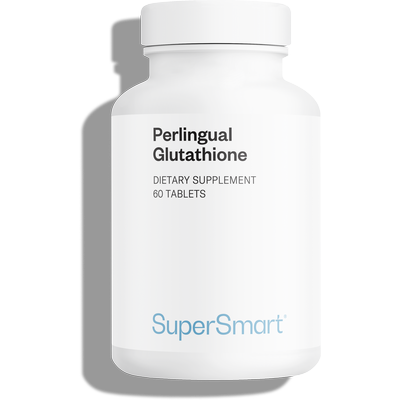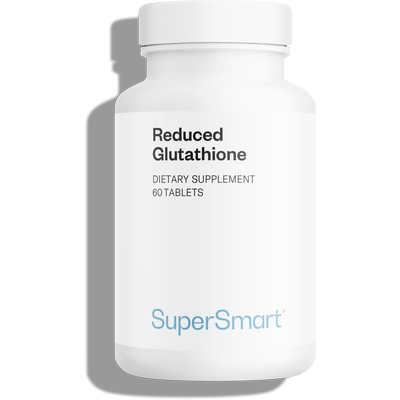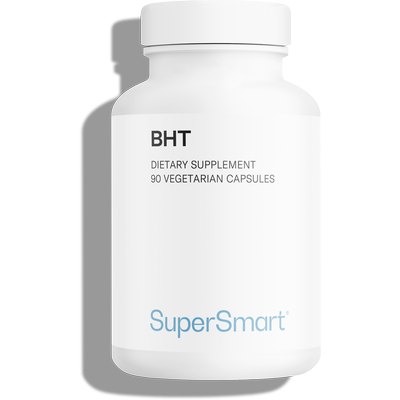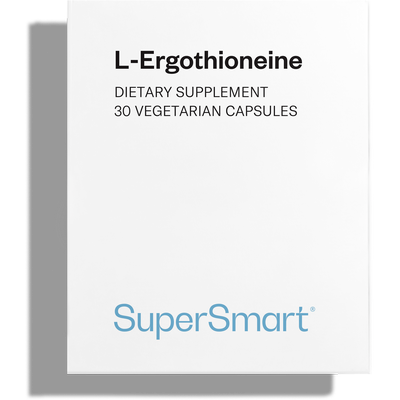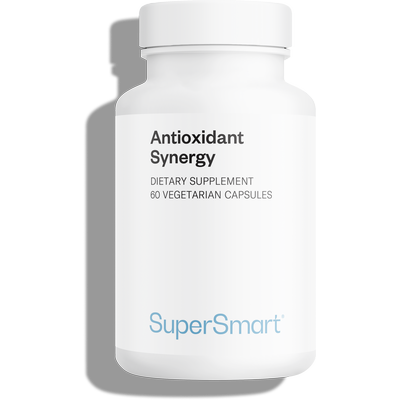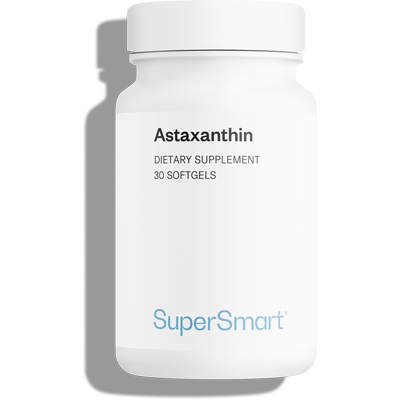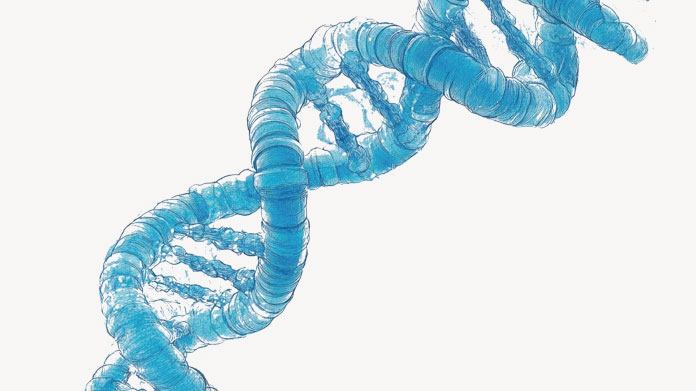Oxidative stress: symptoms, causes and protection
Oxidative stress surreptitiously inflicts terrible damage on our cells. Discover the best ways of protecting yourself from the onslaught of free radicals responsible for ageing.

Oxidative stress: causes
Oxidative stress and ROS
During metabolic reactions, the body naturally produces reactive oxygen species (ROS) (1), better known as free radicals. These include the superoxide radical O2•− and the hydroxyl radical •OH.
With one or more ‘unpaired’ electrons on their outer shells, these ROS are highly unstable: they seek other atoms or molecules to bond to, causing these to become unstable too. Having said that, the formation of ROS is not in itself pathological. It occurs in all aerobic organisms and can even be useful in cell signalling (2).
What’s more, we have a strong arsenal of weapons with which to neutralise them. The body’s first line of defence consists of endogenous antioxidants (those we produce ourselves), made up of antioxidant enzymes, cofactors and proteins (3). Then come the vitamins provided by food, followed by DNA repair mechanisms. In this way, we’re able to maintain a redox balance.
Oxidative stress occurs when there’s animbalance between the generation of free radicals and the ability of antioxidants to neutralise them (4). When our defence mechanisms become overloaded, they can no longer combat oxidation effectively. This compromises cellular integrity, potentially damaging every component of a living organism.
Origin of oxidative stress
Oxidative stress is primarily induced by various exogenous factors: a poor diet with too few fruits and vegetables, smoking, alcohol, medications, pesticides, air pollution, prolonged exposure to the sun, radiation, as well as certain pathogenic infections (5).
Is there a link between psychological stress and oxidative stress?
Oxidative stress is distinct from psychological stress, the former occurring at a cellular level and the latter on a systemic scale. However, there may be an interaction between the two: a study of people with depression suggests that chronic stress contributes to the development of oxidative stress in certain areas of the brain (6).
Oxidative stress: symptoms
Oxidative stress is considered to be one of the main causes of ageing. Clinically, it is implicated in the development of various metabolic diseases (diabetes, atherosclerosis…), as well as respiratory, digestive, neurodegenerative and joint diseases (7).
Oxidative stress assessments are offered by some laboratories which test blood and/or urine for biomarkers of the body’s oxidative load and antioxidant defence status. These should not, however, be interpreted as definitive.
Oxidative stress: consequences
Oxidative stress and inflammation
The body’s immune system perceives excess levels of free radicals as aggressors, and will therefore try to eliminate them by initiating an inflammatory response (8).
If this proves unsuccessful, chronic (or low grade) inflammation sets in over a period of a few weeks to several years. It’s now acknowledged that this prolonged inflammatory state paves the way for auto-immune and cardiovascular diseases as well as chronic inflammatory bowel diseases (CIBD) (9-10).
Oxidative stress and uncontrolled proliferation
There may also be a slight link between oxidative stress and proliferation of abnormal cells. It seems likely that oxidative stress activates various transcription factors (NF-κB, AP-1, p53, HIF-1α, PPAR-γ, β-catenin/Wnt and Nrf2) leading to the abnormal expression of certain genes, including those governing growth factors, inflammatory cytokines and cell cycle regulatory molecules (11).
Oxidative stress and memory
Many studies point to the role of oxidative stress in age-related cognitive decline. In ageing animal models, there appears to be a correlation between changes in temporal and spatial memory, learning and information retention, and increases in oxidative species (12). Research also suggest that free radicals disrupt mitochondrial metabolism and play a part in neuron degeneration (13).
Oxidative stress and the eyes
As delicate organs, our eyes are especially vulnerable to free radical attack. The lens (involved in filtering and directing light) and the retina (responsible for converting light into nerve signals) are among the worst-affected. Oxidative stress may actually promote the onset of eye diseases such as cataracts and AMD (Age-related Macular Degeneration) (14-15).
Oxidative stress and the skin
Oxidative stress also attacks skin cells. It accelerates protein and lipid breakdown, as well as the destruction of collagen and elastin which provide tone and suppleness to the skin. It thus promotes ageing of the skin (by photoxicity in particular) and the premature appearance of wrinkles (16).
Oxidative stress and hair
By weakening the hair bulb, free radicals may accelerate hair loss and contribute to greying of the hair (17).
Oxidative stress: prevention and supplements
‘Common sense’ preventive measures, such as a healthy lifestyle that avoids the above-mentioned risk factors as much as possible, will help to minimise oxidative stress.
A varied, and preferably organic, diet seems to afford better protection against free radicals. More specifically, certain foods offer strong antioxidant potency: fresh, highly-coloured fruits and vegetables (rich in carotenoids and polyphenols), spices, oilseeds and aromatic herbs (18).
It can help to check a food’s ORAC score (oxygen radical absorbance capacity): the higher the figure, the greater its antioxidant potential (19). For example, per 100g, green tea has a score of 1250, walnuts 13,541 and cloves… 290,283!
Some of these super-ingredients are combined in synergistic supplements (the ultra-powerful Antioxidant Synergy contains, amongst others, green tea, grape seed and turmeric, as well as the patented compound Vitaberry® rich in polyphenols and anthocyanins) (20).
Vitamins C and E help protect cells against oxidative stress (21-22). Dietary sources include citrus fruit, peppers, kiwi fruit, almonds and vegetable oils. Vitamin E features in the supplement Astaxanthin, an excellent pink-red pigment from the carotenoid family, extensively studied by anti-ageing researchers.
Trace elements to prioritise include zinc and selenium, key cofactors of enzymes that catalyse oxidation-reduction reactions (23).
Present in almost all living cells, glutathione is one of our most powerful endogenous defence weapons (24). But blood levels decline after the age of 50, so taking a supplement (such as Reduced Glutathione, the only bioactive form, or Perlingual glutathione in the form of suckable tablets for fast administration) can help increase intake (25).
It has been found that the organs most subject to oxidative stress (such as the liver, heart, kidneys, skin and red blood cells) have a high content of L-ergothioneine, an amino acid which is now extracted from mushrooms to produce cutting-edge supplements (the formulation L-Ergothioneine has a half-life of 30 days compared with between 30 seconds and 30 minutes for conventional antioxidants) (26).
Known as BHT, butylated hydroxytoluene is popular in the agro-food sector for its ability to prevent oxidation and rancidity of fats. Scientists are now showing a keen interest in the potential human health applications of this fat-soluble aromatic compound (the main ingredient in BHT which offers an optimal dose of 300mg per capsule).
SUPERSMART ADVICE
References
- Beckhauser TF, Francis-Oliveira J, De Pasquale R. Reactive Oxygen Species: Physiological and Physiopathological Effects on Synaptic Plasticity. J Exp Neurosci. 2016 Sep 4;10(Suppl 1):23-48. doi: 10.4137/JEN.S39887. PMID: 27625575; PMCID: PMC5012454.
- Schieber M, Chandel NS. ROS function in redox signaling and oxidative stress. Curr Biol. 2014 May 19;24(10):R453-62. doi: 10.1016/j.cub.2014.03.034. PMID: 24845678; PMCID: PMC4055301.
- Rizzo AM, Berselli P, Zava S, Montorfano G, Negroni M, Corsetto P, Berra B. Endogenous antioxidants and radical scavengers. Adv Exp Med Biol. 2010;698:52-67. doi: 10.1007/978-1-4419-7347-4_5. PMID: 21520703.
- Sies H. Oxidative Stress: Concept and Some Practical Aspects. Antioxidants (Basel). 2020 Sep 10;9(9):852. doi: 10.3390/antiox9090852. PMID: 32927924; PMCID: PMC7555448.
- Bhattacharyya A, Chattopadhyay R, Mitra S, Crowe SE. Oxidative stress: an essential factor in the pathogenesis of gastrointestinal mucosal diseases. Physiol Rev. 2014 Apr;94(2):329-54. doi: 10.1152/physrev.00040.2012. PMID: 24692350; PMCID: PMC4044300.
- Juszczyk G, Mikulska J, Kasperek K, Pietrzak D, Mrozek W, Herbet M. Chronic Stress and Oxidative Stress as Common Factors of the Pathogenesis of Depression and Alzheimer's Disease: The Role of Antioxidants in Prevention and Treatment. Antioxidants (Basel). 2021 Sep 9;10(9):1439. doi: 10.3390/antiox10091439. PMID: 34573069; PMCID: PMC8470444.
- Birben E, Sahiner UM, Sackesen C, Erzurum S, Kalayci O. Oxidative stress and antioxidant defense. World Allergy Organ J. 2012 Jan;5(1):9-19. doi: 10.1097/WOX.0b013e3182439613. Epub 2012 Jan 13. PMID: 23268465; PMCID: PMC3488923.
- Hussain T, Tan B, Yin Y, Blachier F, Tossou MC, Rahu N. Oxidative Stress and Inflammation: What Polyphenols Can Do for Us? Oxid Med Cell Longev. 2016;2016:7432797. doi: 10.1155/2016/7432797. Epub 2016 Sep 22. PMID: 27738491; PMCID: PMC5055983.
- Kattoor AJ, Pothineni NVK, Palagiri D, Mehta JL. Oxidative Stress in Atherosclerosis. Curr Atheroscler Rep. 2017 Sep 18;19(11):42. doi: 10.1007/s11883-017-0678-6. PMID: 28921056.
- Alemany-Cosme E, Sáez-González E, Moret I, Mateos B, Iborra M, Nos P, Sandoval J, Beltrán B. Oxidative Stress in the Pathogenesis of Crohn's Disease and the Interconnection with Immunological Response, Microbiota, External Environmental Factors, and Epigenetics. Antioxidants (Basel). 2021 Jan 7;10(1):64. doi: 10.3390/antiox10010064. PMID: 33430227; PMCID: PMC7825667.
- Reuter S, Gupta SC, Chaturvedi MM, Aggarwal BB. Oxidative stress, inflammation, and cancer: how are they linked? Free Radic Biol Med. 2010 Dec 1;49(11):1603-16. doi: 10.1016/j.freeradbiomed.2010.09.006. Epub 2010 Sep 16. PMID: 20840865; PMCID: PMC2990475.
- Kandlur A, Satyamoorthy K, Gangadharan G. Oxidative Stress in Cognitive and Epigenetic Aging: A Retrospective Glance. Front Mol Neurosci. 2020 Mar 18;13:41. doi: 10.3389/fnmol.2020.00041. PMID: 32256315; PMCID: PMC7093495.
- Reddy PH. Mitochondrial oxidative damage in aging and Alzheimer's disease: implications for mitochondrially targeted antioxidant therapeutics. J Biomed Biotechnol. 2006;2006(3):31372. doi: 10.1155/JBB/2006/31372. PMID: 17047303; PMCID: PMC1559913.
- Kaur J, Kukreja S, Kaur A, Malhotra N, Kaur R. The oxidative stress in cataract patients. J Clin Diagn Res. 2012 Dec;6(10):1629-32. doi: 10.7860/JCDR/2012/4856.2626. Epub 2012 Oct 14. PMID: 23373015; PMCID: PMC3552191.
- Jarrett SG, Boulton ME. Consequences of oxidative stress in age-related macular degeneration. Mol Aspects Med. 2012 Aug;33(4):399-417. doi: 10.1016/j.mam.2012.03.009. Epub 2012 Apr 9. PMID: 22510306; PMCID: PMC3392472.
- Chen J, Liu Y, Zhao Z, Qiu J. Oxidative stress in the skin: Impact and related protection. Int J Cosmet Sci. 2021 Oct;43(5):495-509. doi: 10.1111/ics.12728. Epub 2021 Aug 28. PMID: 34312881.
- Trüeb RM. Oxidative stress in ageing of hair. Int J Trichology. 2009 Jan;1(1):6-14. doi: 10.4103/0974-7753.51923. PMID: 20805969; PMCID: PMC2929555.
- Carlsen MH, Halvorsen BL, Holte K, Bøhn SK, Dragland S, Sampson L, Willey C, Senoo H, Umezono Y, Sanada C, Barikmo I, Berhe N, Willett WC, Phillips KM, Jacobs DR Jr, Blomhoff R. The total antioxidant content of more than 3100 foods, beverages, spices, herbs and supplements used worldwide. Nutr J. 2010 Jan 22;9:3. doi: 10.1186/1475-2891-9-3. PMID: 20096093; PMCID: PMC2841576.
- Sueishi Y, Ishikawa M, Yoshioka D, Endoh N, Oowada S, Shimmei M, Fujii H, Kotake Y. Oxygen radical absorbance capacity (ORAC) of cyclodextrin-solubilized flavonoids, resveratrol and astaxanthin as measured with the ORAC-EPR method. J Clin Biochem Nutr. 2012 Mar;50(2):127-32. doi: 10.3164/jcbn.11-21. Epub 2011 Nov 18. PMID: 22448093; PMCID: PMC3299942.
- Neetha MC, Panchaksharappa MG, Pattabhiramasastry S, Shivaprasad NV, Venkatesh UG. Chemopreventive Synergism between Green Tea Extract and Curcumin in Patients with Potentially Malignant Oral Disorders: A Double-blind, Randomized Preliminary Study. J Contemp Dent Pract. 2020 May 1;21(5):521-531. PMID: 32690834.
- Kawashima A, Sekizawa A, Koide K, Hasegawa J, Satoh K, Arakaki T, Takenaka S, Matsuoka R. Vitamin C Induces the Reduction of Oxidative Stress and Paradoxically Stimulates the Apoptotic Gene Expression in Extravillous Trophoblasts Derived From First-Trimester Tissue. Reprod Sci. 2015 Jul;22(7):783-90. doi: 10.1177/1933719114561561. Epub 2014 Dec 17. PMID: 25519716; PMCID: PMC4565473.
- Ryan MJ, Dudash HJ, Docherty M, Geronilla KB, Baker BA, Haff GG, Cutlip RG, Alway SE. Vitamin E and C supplementation reduces oxidative stress, improves antioxidant enzymes and positive muscle work in chronically loaded muscles of aged rats. Exp Gerontol. 2010 Nov;45(11):882-95. doi: 10.1016/j.exger.2010.08.002. Epub 2010 Aug 10. PMID: 20705127; PMCID: PMC3104015.
- Mocchegiani E, Malavolta M. Role of Zinc and Selenium in Oxidative Stress and Immunosenescence: Implications for Healthy Aging and Longevity. Handbook of Immunosenescence. 2019 Apr 11:2539–73. doi: 10.1007/978-3-319-99375-1_66. PMCID: PMC7121636.
- Kwon DH, Cha HJ, Lee H, Hong SH, Park C, Park SH, Kim GY, Kim S, Kim HS, Hwang HJ, Choi YH. Protective Effect of Glutathione against Oxidative Stress-induced Cytotoxicity in RAW 264.7 Macrophages through Activating the Nuclear Factor Erythroid 2-Related Factor-2/Heme Oxygenase-1 Pathway. Antioxidants (Basel). 2019 Apr 1;8(4):82. doi: 10.3390/antiox8040082. PMID: 30939721; PMCID: PMC6523540.
- Iskusnykh IY, Zakharova AA, Pathak D. Glutathione in Brain Disorders and Aging. Molecules. 2022 Jan 5;27(1):324. doi: 10.3390/molecules27010324. PMID: 35011559; PMCID: PMC8746815.
- Borodina I, Kenny LC, McCarthy CM, Paramasivan K, Pretorius E, Roberts TJ, van der Hoek SA, Kell DB. The biology of ergothioneine, an antioxidant nutraceutical. Nutr Res Rev. 2020 Dec;33(2):190-217. doi: 10.1017/S0954422419000301. Epub 2020 Feb 13. PMID: 32051057; PMCID: PMC7653990.
- Hossain KFB, Hosokawa T, Saito T, Kurasaki M. Amelioration of butylated hydroxytoluene against inorganic mercury induced cytotoxicity and mitochondrial apoptosis in PC12 cells via antioxidant effects. Food Chem Toxicol. 2020 Dec;146:111819. doi: 10.1016/j.fct.2020.111819. Epub 2020 Oct 19. PMID: 33091556.
56 Days
Very happy with the order and the…
Very happy with the order and the prompt team's response to an identified issue with my order.
KUQI Fatmir
63 Days
15 + years as a customer
I have been using their products for over 15 years as I find both the quality and pricing excellent.
Del Chandler
65 Days
Good quick delivery
Good quick delivery
Timothy O Shea
66 Days
Good service
Good communication following order. Product came within the time frame and was well packaged. The only confusing thing I found was in checking out. For some reason it is not clear how to do so and the current system should be improved.
Joe O Leary
75 Days
Simple and fast.
Simple and fast.
Nina
76 Days
Great product was definitely what is…
Great product was definitely what is says and arrived on without issue
customer
82 Days
I love reading those product facts on…
I love reading those product facts on Supersmart.com. Effective health products making permanent changes to my blood-work results and testes. However, I also have to order capsules from other websites.
NORDGULEN Olav
84 Days
Great products
Great products Very easy to choose, to order… and to get at home
Federica mastrojanni
87 Days
Service rapide et bons produits
Service rapide et bons produits
customer
88 Days
Good products and fast delivery
Good products and fast delivery
Trusted
93 Days
Does what it says on the can
I believe in this product Made to highest standard The ordering process is straightforward Delivery time prompt Excellent product, excellent service Happy customer ❤️
Sheba Kelleher
98 Days
Excellents produits
Excellents produits. Rien à dire si ce n'est qu'ils sont très chèrs.
MJS_France
100 Days
Very good supplement
Very good supplement
Glaveash
101 Days
Supersmart supplements are really…effective
Supersmart supplements are really effective and have helped me and family members and friends to improve their health including some of us with severe health problems including some with no existing medical treatment.
Anne Georget
102 Days
SuperBig Supersmart
SuperBig Supersmart
Pierre

